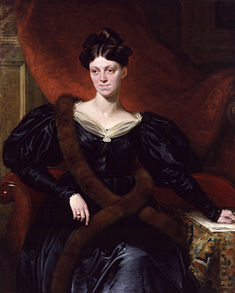Harriet Martineau
| Harriet Martineau | |
|---|---|

Harriet Martineau by Richard Evans (1834 or before)
|
|
| Born |
12 June 1802 Norwich, United Kingdom |
| Died | 27 June 1876 (aged 74) Ambleside, United Kingdom |
| Nationality | British |
| Notable works |
Illustrations of Political Economy (1834) Society in America (1837) Deerbrook (1839) The Hour and the Man (1839) |
Harriet Martineau (/ˈmɑːrtənˌoʊ/; 12 June 1802 – 27 June 1876) was a British social theorist and Whig writer, often cited as the first female sociologist.
Martineau wrote many books and a multitude of essays from a sociological, holistic, religious, domestic, and perhaps most controversially, feminine perspective; she also translated various works from Auguste Comte. She earned enough to be supported entirely by her writing, a rare feat for a woman in the Victorian era.
A young Princess Victoria enjoyed reading Martineau's publications. The queen invited Martineau to her coronation in 1838 —an event which Martineau described, in great and amusing detail, to her many readers. Martineau said of her own approach to writing: "when one studies a society, one must focus on all its aspects, including key political, religious, and social institutions". She believed a thorough societal analysis was necessary to understand women's status under men.
The novelist Margaret Oliphant said "as a born lecturer and politician she [Martineau] was less distinctively affected by her sex than perhaps any other, male or female, of her generation." Martineau introduced feminist sociological perspectives into her writing on otherwise overlooked issues such as marriage, children, domestic and religious life, and race relations.
The sixth of eight children, Harriet Martineau was born in Norwich, England, where her father Thomas was a textile manufacturer. A highly respected Unitarian, he was also deacon of the Octagon Chapel, Norwich from 1797. Harriet's mother was the daughter of a sugar refiner and a grocer.
...
Wikipedia
